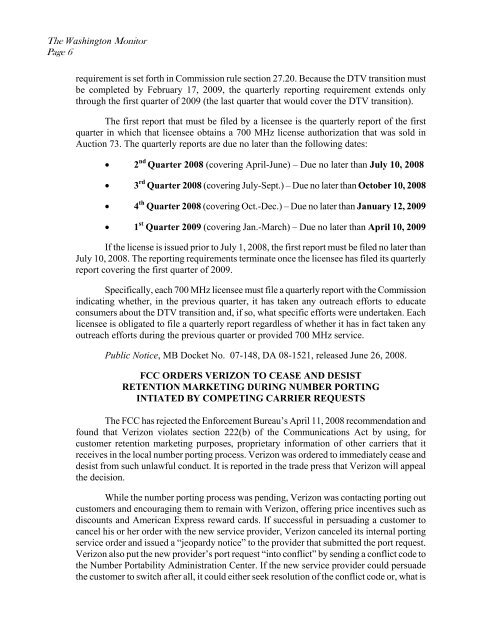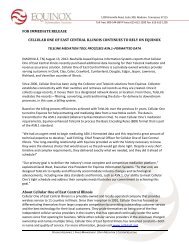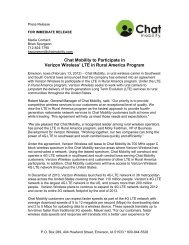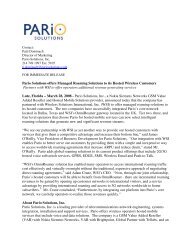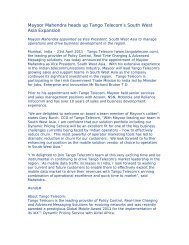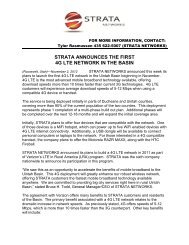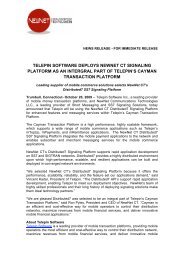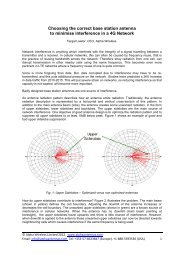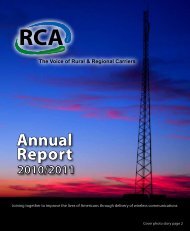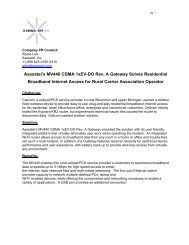Details - Competitive Carriers Association
Details - Competitive Carriers Association
Details - Competitive Carriers Association
Create successful ePaper yourself
Turn your PDF publications into a flip-book with our unique Google optimized e-Paper software.
The Washington Monitor<br />
Page 6<br />
requirement is set forth in Commission rule section 27.20. Because the DTV transition must<br />
be completed by February 17, 2009, the quarterly reporting requirement extends only<br />
through the first quarter of 2009 (the last quarter that would cover the DTV transition).<br />
The first report that must be filed by a licensee is the quarterly report of the first<br />
quarter in which that licensee obtains a 700 MHz license authorization that was sold in<br />
Auction 73. The quarterly reports are due no later than the following dates:<br />
• 2 nd Quarter 2008 (covering April-June) – Due no later than July 10, 2008<br />
• 3 rd Quarter 2008 (covering July-Sept.) – Due no later than October 10, 2008<br />
• 4 th Quarter 2008 (covering Oct.-Dec.) – Due no later than January 12, 2009<br />
• 1 st Quarter 2009 (covering Jan.-March) – Due no later than April 10, 2009<br />
If the license is issued prior to July 1, 2008, the first report must be filed no later than<br />
July 10, 2008. The reporting requirements terminate once the licensee has filed its quarterly<br />
report covering the first quarter of 2009.<br />
Specifically, each 700 MHz licensee must file a quarterly report with the Commission<br />
indicating whether, in the previous quarter, it has taken any outreach efforts to educate<br />
consumers about the DTV transition and, if so, what specific efforts were undertaken. Each<br />
licensee is obligated to file a quarterly report regardless of whether it has in fact taken any<br />
outreach efforts during the previous quarter or provided 700 MHz service.<br />
Public Notice, MB Docket No. 07-148, DA 08-1521, released June 26, 2008.<br />
FCC ORDERS VERIZON TO CEASE AND DESIST<br />
RETENTION MARKETING DURING NUMBER PORTING<br />
INTIATED BY COMPETING CARRIER REQUESTS<br />
The FCC has rejected the Enforcement Bureau’s April 11, 2008 recommendation and<br />
found that Verizon violates section 222(b) of the Communications Act by using, for<br />
customer retention marketing purposes, proprietary information of other carriers that it<br />
receives in the local number porting process. Verizon was ordered to immediately cease and<br />
desist from such unlawful conduct. It is reported in the trade press that Verizon will appeal<br />
the decision.<br />
While the number porting process was pending, Verizon was contacting porting out<br />
customers and encouraging them to remain with Verizon, offering price incentives such as<br />
discounts and American Express reward cards. If successful in persuading a customer to<br />
cancel his or her order with the new service provider, Verizon canceled its internal porting<br />
service order and issued a “jeopardy notice” to the provider that submitted the port request.<br />
Verizon also put the new provider’s port request “into conflict” by sending a conflict code to<br />
the Number Portability Administration Center. If the new service provider could persuade<br />
the customer to switch after all, it could either seek resolution of the conflict code or, what is


